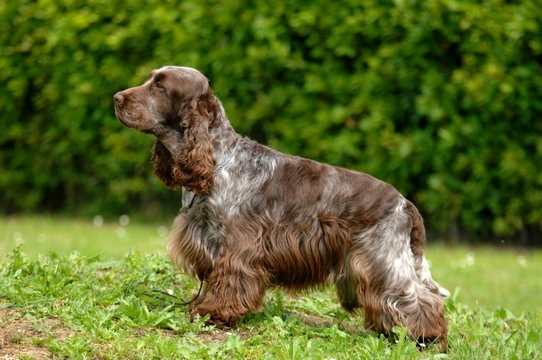
Adult Onset Neuropathy (AON)
Adult onset neuropathy or AON is a hereditary health condition that can be found in certain breed lines of the cocker spaniel dog breed, and which doesn’t generally present in affected dogs until they are middle aged or mature, meaning that affected dogs may have been used for breeding prior to diagnosis.
However, a DNA health testing scheme is in place in the UK to permit breeders and buyers of cocker spaniels to find out the status of their own dogs, and so, make an informed decision on any potential mating match.
Adult onset neuropathy is a neurological disorder that causes a progressive weakness of the hind limbs that later spreads to the front limbs too, as well as having a range of other affects that can compromise the dog’s ability to eat and drink normally as well as move around.
In this article, we will look at adult onset neuropathy in cocker spaniels in more detail, covering the heredity of the condition, what sort of dogs are at risk, and how to make an informed decision on breeding or buying a dog of the breed. Read on to learn more.
What is adult onset neuropathy?
Adult onset neuropathy affects the dog’s nerve pathways and responses, which ultimately affects the dog’s movement in both the hind and forelimbs, causing weakness, tremoring and unsteady and uncoordinated movements, as well as problems getting up and down, climbing and jumping. The condition first presents with symptoms in the hind limbs, and once AON progresses to the front limbs, it is apt to affect the nerves of the dog’s larynx or voice box too, causing additional problems including difficulty swallowing, and aspirating food and water, which can lead to choking or pneumonia.
Adult onset neuropathy rarely develops symptoms in dogs below the age of seven to eight years old, and if present, will almost certainly develop before the dog reaches their ninth birthday. The condition progresses over time at a reasonably slow rate, taking three to four years to reach its pinnacle. Adult onset neuropathy cannot be treated or cured, and management of the condition in affected dogs is usually supportive and palliative. Ultimately, a decision is usually made to euthanise affected dogs once their quality of life becomes affected to a significant degree, in order to prevent prolonged suffering.
What sort of dogs are at risk?
Adult onset neuropathy is only considered to be a risk for dogs of the cocker spaniel breed, although there have been a small number of notable presentations of the condition in field spaniel breed lines that have a history of outcrossing with cockers, which permits the introduction of breed-specific health conditions into unrelated dog breeds.
While dogs develop the condition later in life, it is present from birth, although unlikely to become symptomatic until the dog in question is at least seven, and often older. Both males and females are equally likely to be affected, and the presentation of the condition does not differ significantly along gender lines.
How is the condition passed from dog to dog?
Adult onset neuropathy is a hereditary health condition, meaning that the only way for a dog to develop the disease is to inherit it-it cannot be caught or spread from dog to dog in any other way.
The mode of heredity for adult onset neuropathy is autosomal recessive, which means that in order for any given dog to inherit the condition, they first have to have inherited the right combination of faulty genes from both sides of their parentage.
When talking about autosomal recessive health conditions, dogs are assigned with a status of either clear, affected or carrier respectively. Dogs with carrier status will never become ill with the condition themselves, but they can pass it on to their own offspring, depending on the status of the dog they are bred with.
Knowing the status of both parent dogs is important, in order to predict the status of their litter. The model by which the status of any given litter can be determined is as follows:
- Two clear dogs will produce a clear litter.
- Two affected dogs will produce an affected litter.
- Two carrier dogs will produce a litter with 50% of the pups being carriers, 25% affected and 25% clear.
- A clear dog and an affected dog will produce a litter of carriers.
- A clear dog and a carrier will produce a litter of 50% clear pups and 50% carriers.
- A carrier and an affected dog will produce a litter of 50% carriers and 50% affected pups.
Health testing, and purchasing and breeding healthy dogs
Because adult onset neuropathy in the cocker spaniel dog breed does not present with symptoms in affected dogs until they are at least seven, health testing prior to breeding is vital in order to ensure that any given mating match does not ultimately result in a litter of affected dogs.
Pre-breeding health screening can be carried out by means of DNA testing and of course, both parent dogs must be tested in order to ensure that the health of their litter can be predicted prior to going ahead.
If you intend to breed from your cocker spaniel, it is vital to have their status and that of their mate tested first, and if you are planning on buying a cocker puppy, ask the breeder for evidence of their testing protocol and the results that both parent dogs received prior to committing to a purchase.



